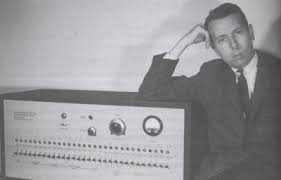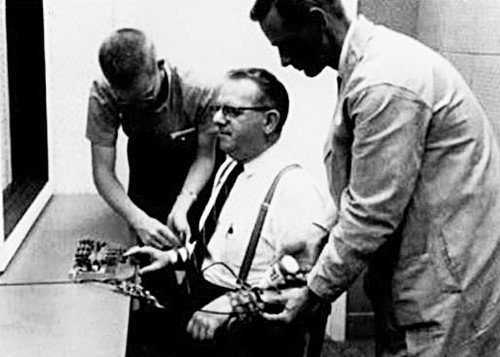How far are we able to go in order to obey?
Stanley Milgram, was a psychologist at Yale University who in 1963 published an article in the journal "Journal of Abnormal and Social Psychology" under the previously mentioned name. For the realization of this article, it was based on the results of a social experiment that began to take place in mid-July 1961, in which it was aimed to determine, to what extent a person is able to obey the authority and how he can justify his actions through that obedience. The "inspiration" for this investigation came to Milgram after Adolf Eichman, a former colonel of the SS, was tried in April of that same year for his participation in "the final solution" during the Second World War.

The experiment.
The Milgram experiment, although simple, had all the necessary elements to study human behavior in depth when it is directed by an authority figure. For this he used anonymous volunteers attracted by an advertisement requesting participants for a "study of memory and learning" and they were offered a payment for participation, of course that was not the reason or the nature of the study, a small lie that created Milgram to have their participants thinking that they were going to study their memory capacity and not their obedience. The participants were between 20 and 50 years old and all with different schooling, from students to professionals with doctorates.
How was it done?.
It consisted of 3 main components, the "student", which is an accomplice of the experimenter, the "teacher", who is the volunteer who saw the announcement for the experiment, and the experimenter who would be the authority figure. To determine the roles of student and teacher in an "impartial" and credible way, papers were placed in a container and both the accomplice and the volunteer took a role that would determine who would be a student and teacher. Of course all the papers were labeled as teachers, making the volunteer believe he was being imposed or appointing him as a random teacher. After this, the student is seated in a chair and a series of cables are placed which will supposedly give him an electric shock each time he fails, and the teacher is given a list of words that he should recite to the student and tell him that must learn by heart, the experimenter explains to the teacher that each time your student is wrong to remember a word or the sequence, it must provide an electric shock which will increase in potential as the student goes wrong, both teacher As a student you are given a small 45 volt discharge so that both know that the device works and the pain it provides. After this the experimenter sits in the same room as the teacher which is separated by a glass of the student, and asks to start the experiment.

The experiment begins with dischards ranging from 15 volts to a last of 450. But what the teachers doesnt know is that none of the dischards they're giving are real, since the student is previously told how to react to each one, acting, so that the teacher thinks that he is infringing pain. Upon reaching the 75 volts and seeing the discomfort of their "students" some teachers began to ask the experimenter to stop the experiment but this made them continue with the words:
*Continue please.
- The experiment requires you to continue.
- It is absolutely essential that you continue.
*You do not have any choice. It must continue.
Some teachers stopped when they reached 135 volts, others said they did not take responsibility for the consequences and continued until they reached 450. In the end, 65% of the participants (26 out of 40) applied the 450 volt discharge.

What does this tell us? (personal analysis).
At the end of the experiment many criticized Milgram for the amount of stress induced in their volunteers, but it should be noted that, despite having been there inflicting harm on a person, none of them requested that such sessions be stopped, and very few They asked to see the student to make sure he was ok after being informed that everything was a hoax. Personally, this experiment has always seemed interesting to me. How is it possible for one person to constantly damage another? Even though he is seeing him suffer, questions herself as to what she or he is doing right or wrong. Why follow? In my opinion, it is because these authority figures make us think that it is not us the ones pushing the buttons or hitting the innocent, but it is the authority itself that "forces" us to do so, justifying our actions in this way, and this leads me to think that maybe this is the way many people act under a regime of authoritarian government or under the command of a ruthless leader, they can end up doing the most atrocious or immoral actions, not only one time but repeatedly without having any emotional or psychological sequelae because, in their mind, it is the authority that orders, and they only obey ...
If you liked this post let me know and we will continue talking about other social experiments, I would also like to know your opinion about the authority and how it can influence the behavior of a person.
Hola amigo quiero crear un chat(no grupo) un chat para enviarnos los enlaces por facebook y recibir y dar votos ,te animas ??
Ya tengo hecha la cuenta de facebook. Es la siguiente: https://www.facebook.com/samy.blackcinder.1
Ok amiga yo la busco y agrego al chat